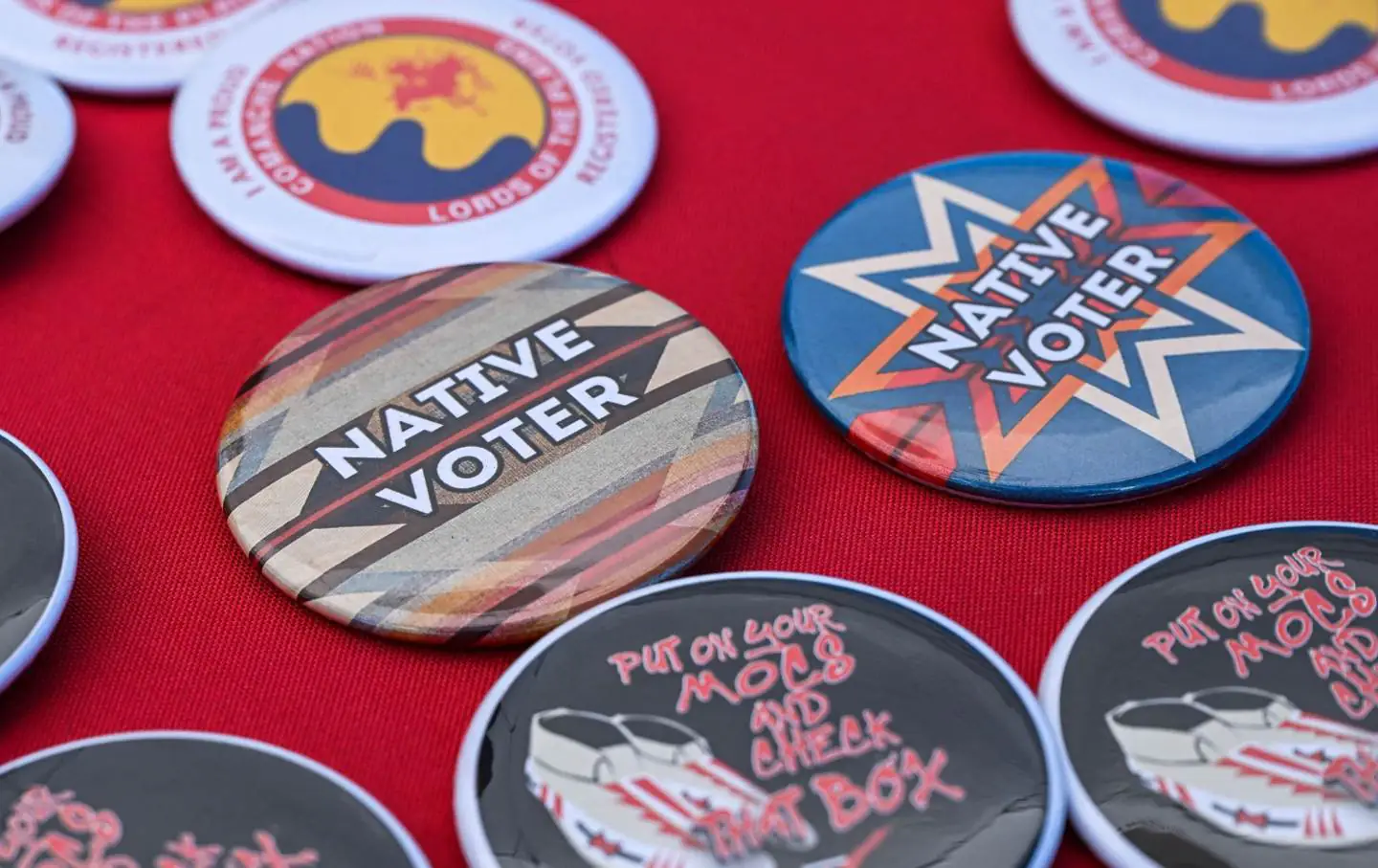[ad_1]
Policy
/
September 25, 2024
Democrats in Indian Country organize under the slogan: “Voting is sacred.” But some Indians wonder why they should participate in a system that ignores them.
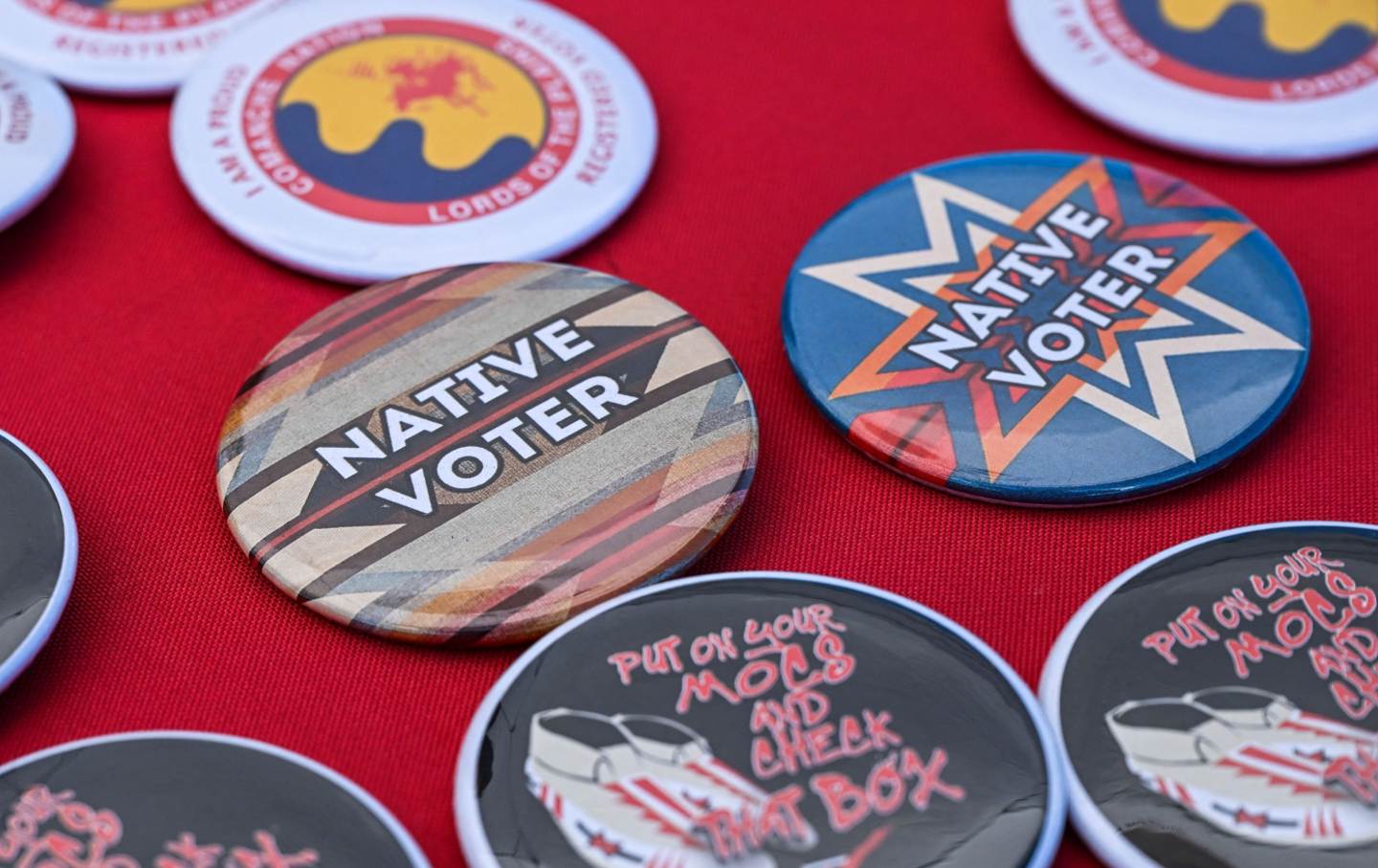
“Are you going to vote?” I asked Diannah Reid, a full-blooded Navajo survivor of an Indian boarding school. He has scars on his palms where his teacher used to hit him with a ruler when he spoke his language.
“No,” he said. “Why? If I do, will they give us the land back?
Current number

During the presidential debate between Kamala Harris and Donald Trump, black and Hispanic Americans were discussed, but Native Americans were not.
“They can’t see us,” he said. “Just our existence makes them uncomfortable. They know they are on stolen land – all of them – and voting is not sacred.”
Reid, 31, cited a slogan and movement led by Young Native Democrats in Indian Country that declares, “Voting is sacred.”
He said democracy existed in the so-called “New World” long before the colonial invasion and on reservation voting “the old way.” there is holy. “White people like to say that the Greeks gave us democracy,” he said. “It was here for centuries before they accidentally wandered onto our land.”
“But I play along,” he said. “So if I vote, will Columbus Day be abolished? Will they give the Black Hills back to the Lakota or stop poisoning our water with fracking? Of course they won’t.” (Harris said during the presidential debate that he would not ban fracking as president.)
Reid, who was born on the Navajo Nation in what is known as the Western Agency, said the erasure of indigenous voices is evident in the speeches of both presidential candidates and the press. “Watch MSNBC,” he said. “How many natives are there? Did they mention the asshole who said we were drunk at age 8? a.m and throwing Coors cans? Not.”
An audio recording of Tim Sheehy speaking at a private 2023 fundraiser was recently leaked. In it, the Trump-backed Republican candidate trying to oust Montana’s Democratic senator, Jon Tester, referred to Native Americans as drunks.
“Great way to bond with all the Indians to be out while I’m drunk at 8 a.m”, he he saidwe are talking about the Crow Nation. “They’ll let you know if they like it or not,” Coors Light cans fly past your head.
Sheehy has yet to apologize for his comments.
Native vote could help Democrats hold Senate in Montana; Native Americans make up about 6.5 percent of the state’s population, enough to swing a close election. Tester is starting to fall behind Sheehy though opinion polls. If Sheehy wins, the Senate could go from blue to red.
Regarding Sheehy, Reid told me that “when it comes to Native Americans, you can be as racist as you want in America and we can get away with it. Just look at the [Kansas City] Chiefs and the tomahawk chop. This is American racism in prime time and clearly in politics.”
Popular
“Swipe to the bottom left to see more authors”Slide your finger →
Native Americans are ubiquitous in the media as Indian mascots, but there is almost no Native representation on the hard news page. Either racist caricatures or nothing. I have been told time and time again that this means that Aboriginal people, especially young Aboriginal people, will choose not to vote in the presidential election, and they will. To feel like voting matters, you have to feel seen, but many natives don’t.
During the 2020 presidential election, for example, CNN listed white, Latino, black, and Asian, but Native Americans as “something else.” Elders across the country were furious, fearing that erasing the country’s First Peoples from the media could discourage Indigenous people from voting in the presidential election.
Sonny Skyhawk, the Sicangu Lakota and the broad representation of indigenous people in the media, said that Americans’ subconscious dislike of Indians comes from Hollywood, especially Western movies. “They had to make a bad guy, and we still are,” he said.
Regarding mainstream news pundits’ infrequent mention of Sheehy’s racist comments, Skyhawk said, “We’re not important enough to them to be consulted.”
And according to NBC Universal, only 0.4 percent its workers refer to themselves as Native – they call themselves “Indians” – which means that anyone can claim to be Indian by checking the box, including people who are called “box-checkers” or “high cheekbones” in Indian Country.
But the 80-year-old Skyhawk disagrees with Reid on one topic — voting. He believes voting can be good for Indigenous peoples: “Indigenous peoples are not part of the equation, so they don’t participate in it, but you have to participate in the system in order for the system to change and for that change to happen.”
Elections in many Native nations and tribes are very different from state and federal elections in the United States. For example, Lakota voting begins with the women’s council. For centuries, women have chosen candidates. It is a sacred process, not only because it is an ancient practice, but also because it is tied to Lakota spirituality.
It also makes sense politically, Walt Pourier, an Oglala Lakota artist, told me. “There is no better judge of a man’s character than a woman,” he said. “Men like to beat their chests and be manly with each other. Women know your vulnerabilities and weaknesses behind closed doors. And they tell you when you are weak and vulnerable; they know if you are the type to drive. That’s how they ended up choosing our bosses.”
Pourier’s daughter Leala, 23, said: “It is [American] the system does not include us – natives.” He said that while “we can’t have a Trump,” Harris’ stance on the Palestinian genocide is why he hasn’t decided whether to vote this November.
“They are demonizing Aboriginal people here and overseas,” he said. “For me, that extends to Palestine.” Leala said if Harris and Trump can’t and won’t acknowledge the genocide against the Palestinians, how will they ever acknowledge the genocide of the natives on the land they live in?
“You can’t even recognize the natives here and settle for the Gaza genocide,” Leala said.
Still, Allie Young — a full-blooded Navajo, screenwriter and founder of Ride to the Polls, a campaign in which Native Americans go door-to-door on horseback to vote for president — said that even though white people still don’t believe wholeheartedly in the indigenous vote, “we are still showing our political power”.
“But MSNBC?” I asked. “Oh yes, they are. Well, we fight to be seen, he answered.
Deb Haaland, Secretary of the Interior and a citizen of Laguna Pueblo, New Mexico, wrote an op-ed in Indians that he believes voting is sacred and that “we must use our voice in every election.”
Haaland, who became the first indigenous person to be appointed cabinet secretary in 2020, added that indigenous people honor their ancestors by voting, including in the US presidential election: “Our ancestors and relatives survived seemingly insurmountable difficulties, so we owe it to them to hear our voice at the ballot box.”
Rae Fancher, the first Alaska Native woman to graduate from the Naval Academy, is voting this year, but she understands why other Alaska Natives aren’t. He said he feels invisible to the press and politicians. “I can’t remember the last news story that focused on Alaska Natives,” he said. “I’ve been told ‘I thought they were all dead’ several times in my life – my people as a whole are taught in the past tense.”
He told me, “Voting is important and vital, but white people are going to get what white people want.” Fancher added that she will vote for Harris in November, if only to protect her ancestral home from the extractive industry in northern Alaska: “This way we can protect our way of life, the way we’ve lived for thousands of years.”
Reid, like many others I spoke with, said that the mainstream media ignores Indigenous voices, and that if you’re ignored when so much of the media is deliberately oblivious to your political aspirations, why would it be sacrosanct to be part of the electoral process? participation? Why even participate, Reid wondered? “Can’t you see us? “Fuck it back,” he said.
Aboriginal people, young and old, are working hard across the country to get out the Aboriginal vote, but on November 5, Reid is doing something he believes is more productive – “a little self-care”.
“I’ll probably sit down in a coffee shop and sketch,” he said. “Others can vote for president if they want. I am not obligated.”
Can we count on you?
In the next election, the fate of our democracy and our basic civil rights will be on the ballot. The conservative architects of Project 2025 seek to institutionalize Donald Trump’s authoritarian vision at all levels of government should he win.
We have seen events that fill us with fear and cautious optimism—all the while, The Nation he was a bulwark against misinformation and an advocate for bold, principled viewpoints. Our dedicated writers interview Kamala Harris and Bernie Sanders, unpack JD Vance’s shallow right-wing populist appeals, and discuss the path to Democratic victory in November.
Stories like this and the one you have just read are vital at this critical juncture in our country’s history. Now more than ever, we need clear-eyed and in-depth independent journalism to make sense of the headlines and sort fact from fiction. Donate today and join our 160-year legacy of speaking truth to power and raising the voice of local advocates.
In 2024, which will likely be the defining election of our lifetimes, we need your support to continue delivering the insightful journalism you rely on.
Thanks,
The editors The Nation
More here The Nation
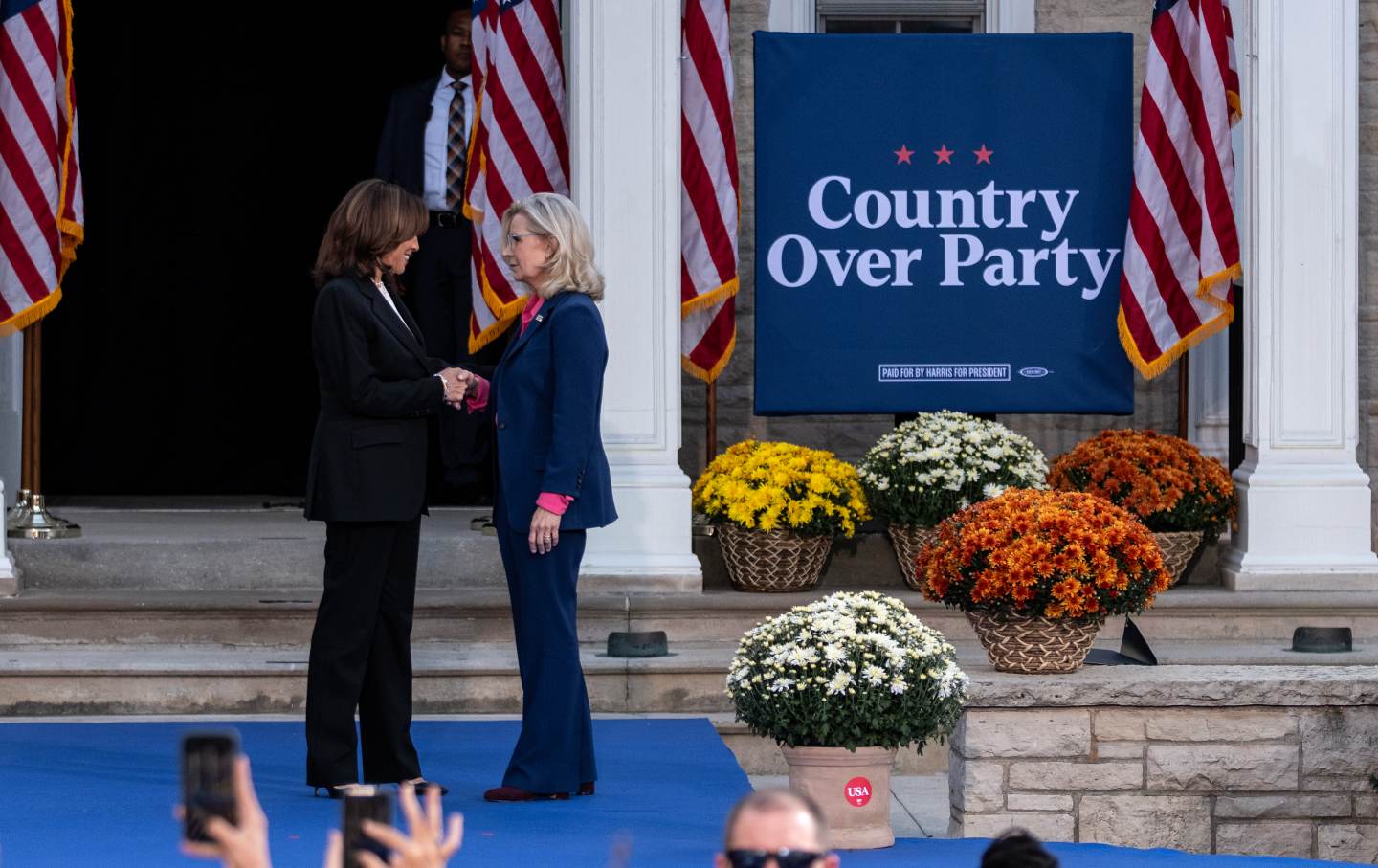
Kamala Harris is trying to appeal to centrist Republicans, but what if they don’t exist? And what if their search causes him to leave the Democratic base?
Dave Zirin
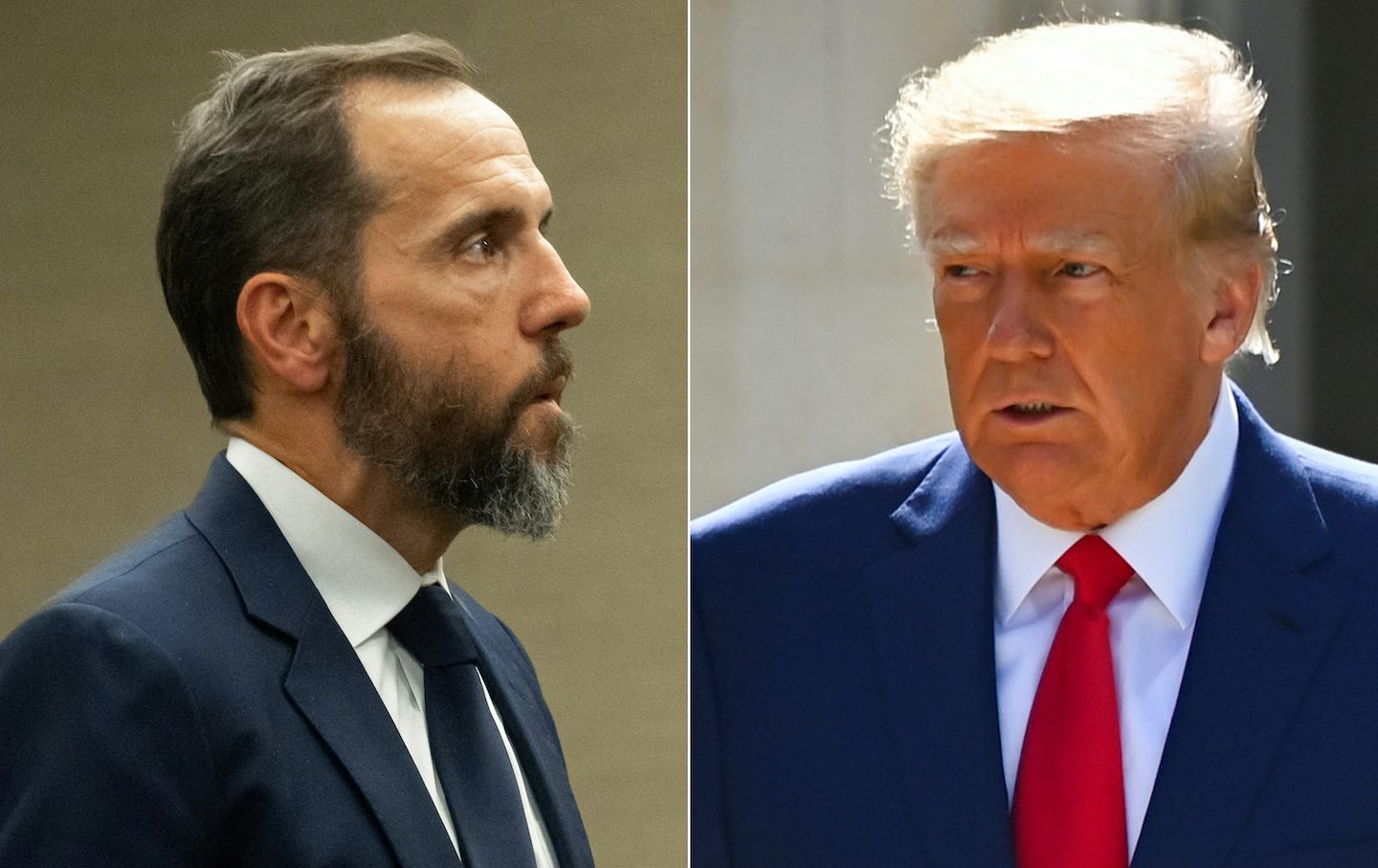
A new filing from special counsel Jack Smith claims that even in light of a Supreme Court ruling granting immunity to presidents, a person seeking the office will be held criminally liable…
Chris Lehmann
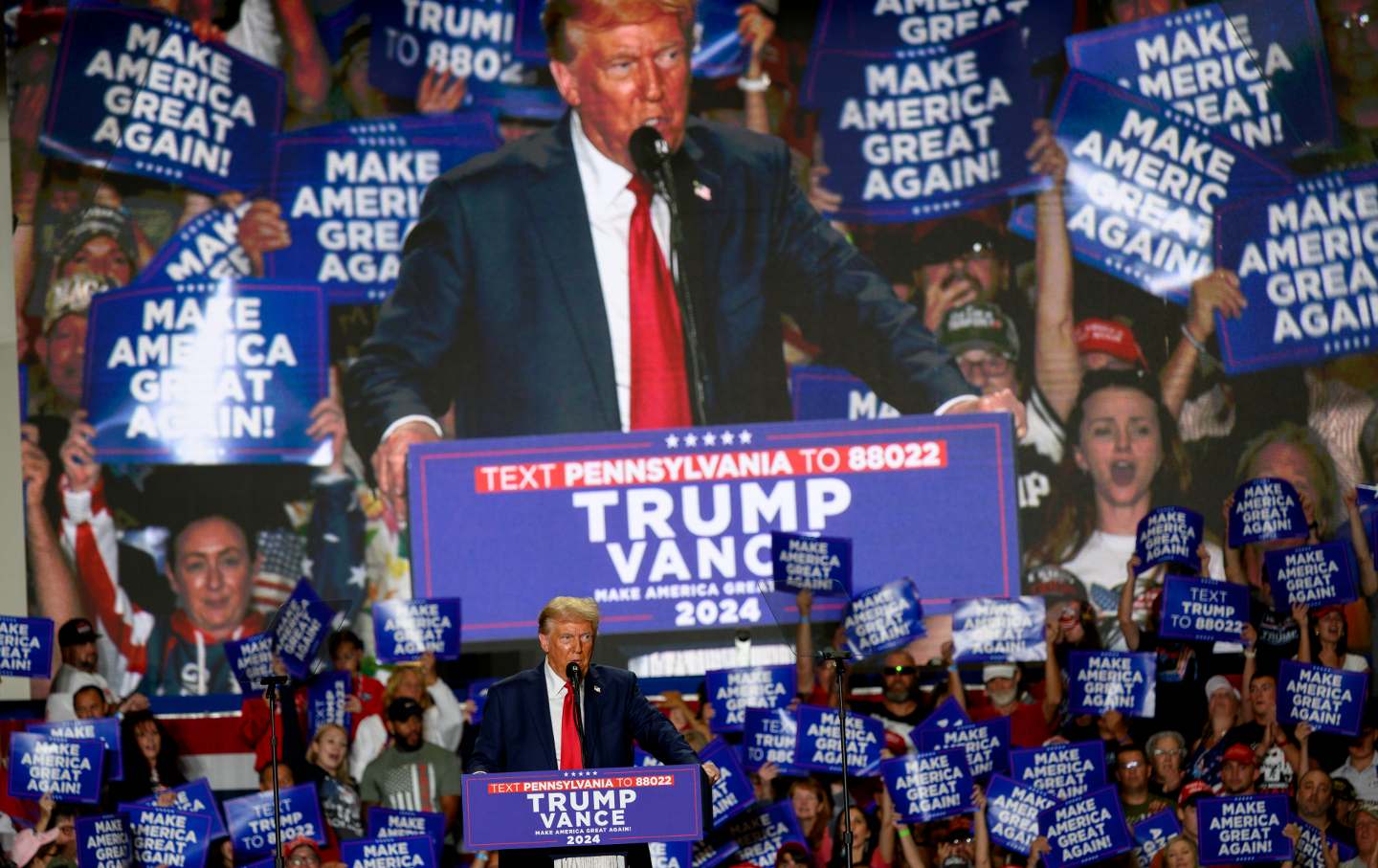
Trump’s base loves him not because the former president wants to fight crime, but because he wants retribution.
Sasha Abramsky
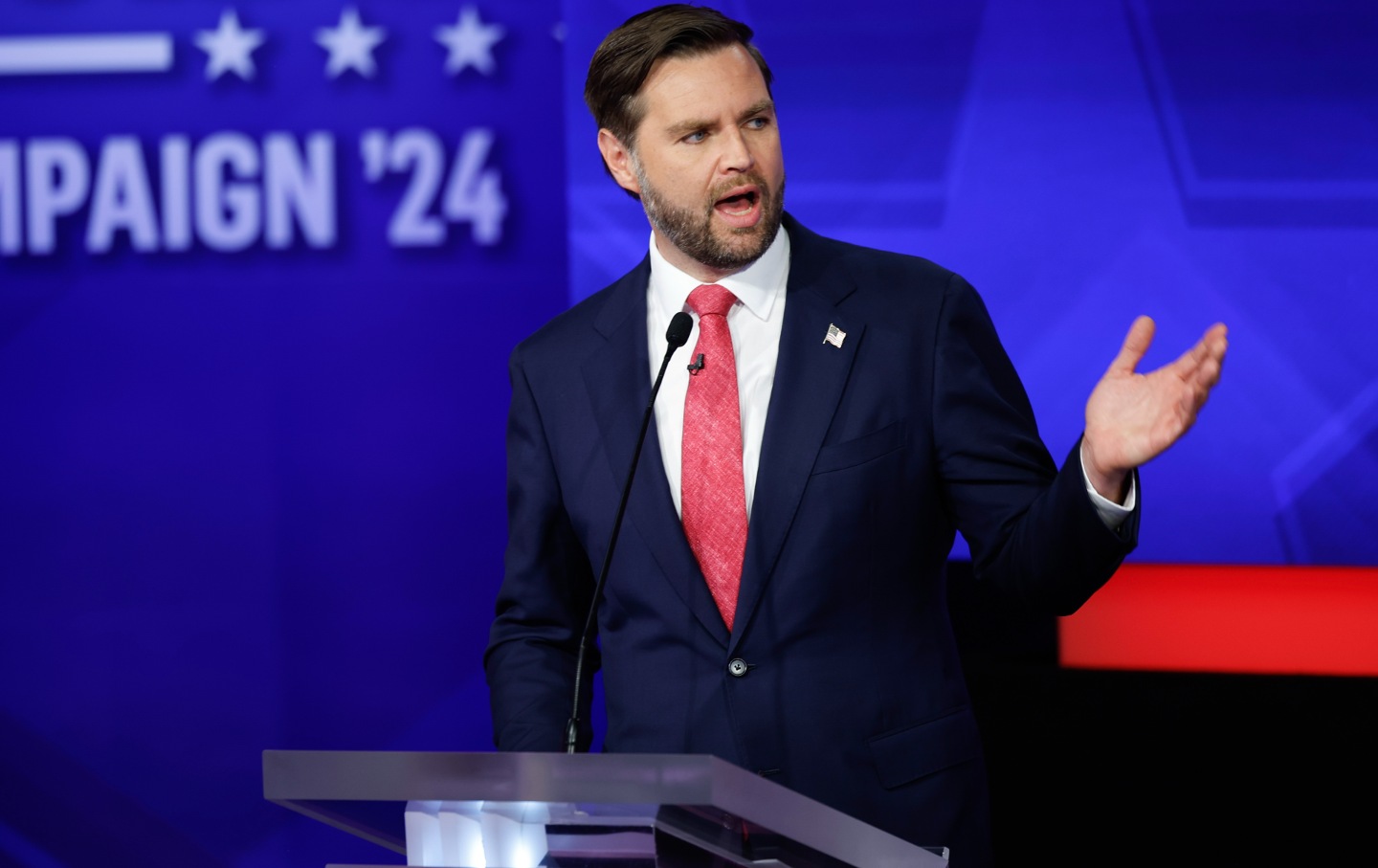
Mainstream journalists are overcomplicating something very simple: Republicans want a nationwide abortion ban.
Joan Walsh

